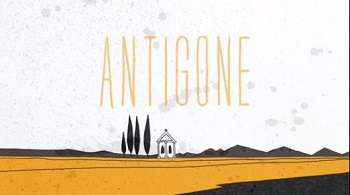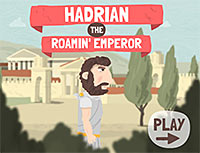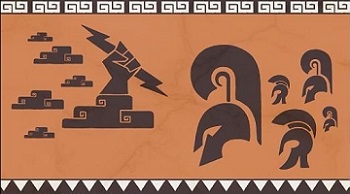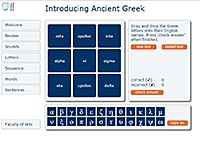Open Access Resources and Taster Materials
- Study materials from Open University modules
- Animated myths and stories
- Online language resources
- Additional resources
Study materials from Open University modules
The following materials provide a taste of undergraduate and postgraduate modules which cover Classical Studies.
Level One
Discovering the Arts and Humanities (A111)

Our multidisciplinary Level 1 module covers a range of topics from classical antiquity, including a study of the Greek tragedy Antigone. This animation on OpenLearn introduces you to the story of this mythical figure.
This trailer video for A111 also gives you a taste of the module’s content.
Cultures (A112)
The OpenLearn unit Travelling for Culture: the Grand Tour is an adapted extract from another multidisciplinary Level 1 module. It provides an introduction to the 18th and 19th century phenomenon of the Grand Tour and explores its fascination with Roman monuments like the Colosseum.
A trailer video for A112 is also available online.
Level Two
Exploring the Classical World (A229)
Introducing Homer's Iliad (a 6 hour course) on OpenLearn focuses on the opening of the Iliad, and explores some characteristics of Homer’s epic poetry.
Classical Latin: The Language of Ancient Rome (A276)
Introducing Virgil’s Aeneid is an OpenLearn course which focuses on the characterisation of the legendary hero Aeneas.
Over on YouTube, you can listen to a brief introduction which outlines the content of this module and explains some of the benefits of learning Latin and studying Roman literature, both in the original language and in translation.
Level Three
The Roman Empire (A340)

Hadrian's Rome (a 10 hour course) on OpenLearn lets you explore the impact that the emperor Hadrian (117-38 CE) had on the appearance of the city of Rome and why this was significant. It introduces you to a range of types of evidence, including literary sources, inscriptions, coins and buildings and how these can be brought together to answer questions about the role of the emperor and the ways in which the wider empire was made visible in the architecture of Rome itself.
Roamin' Hadrian
To whet your appetite for The Roman Empire, try this interactive game in which you can help Hadrian put together his passport and then join him as he travels around the empire. Along the way you will learn about his character, work and love life, meet other key figures and collect souvenir artefacts for his villa in Tivoli.
You can watch a short video introduction to this module on YouTube.
Greek and Roman myth: stories and histories (A350)
A short video introduction to this module is available on YouTube.
MA in Classical Studies
A863 and A864
The Library of Alexandria
This OpenLearn unit addresses one of the central questions of our MA foundation unit: how do we know what we know about antiquity? It explores the evidence that we have for the ancient Library and its destruction, and the varied ways in which it has been represented in the modern world.
The Body in Antiquity
This OpenLearn unit will introduce you to the topic of the Subject Section of the MA part 2: the body in Greek and Roman civilisation. The way that people fulfil their basic bodily needs and engage in their daily activities is embedded in the social world around them. Through the body we can discover fascinating aspects of both Greek and Roman culture. This unit will explore the ancient body from a variety of angles: through archaeological objects, philosophy and comparison with other cultures.
Animated myths and stories
We've worked on a range of animations which condense the narratives of some well-known ancient myths and texts into short films:

Online language resources
A wide range of open access materials have been developed to introduce you to the study of ancient Greek and Latin, and to support your independent learning of these languages.
Greek

Our OpenLearn course, Getting Started on Ancient Greek, is a 16 hour course which starts with the alphabet and effective ways to memorise it, before building up to complete Greek words and sentences. Along the way, you will see numerous real examples of Greek as written on objects from the ancient world. This short animation which accompanies the course sets out 4 good reasons for studying Greek.
Our language website, Introducing Ancient Greek, allows you to familiarize yourself with the letters and sounds of Ancient Greek, gives you practice at forming Greek words, and introduces you to simple Greek sentences.
For additional Greek resources, visit our Learning Ancient Greek webpage.
Latin
Introducing Classical Latin
This site will help you prepare for a beginner's Latin course, such as Classical Latin: the language of Ancient Rome (A276). You can learn about Latin pronunciation, master some basic vocabulary, and explore the basic principles of Latin word order and sentence structure.
Interactive Latin
This site allows you to quiz yourself on Latin noun, verb and adjective endings, providing useful consolidation or revision practice, whether you are relatively new to the study of the language or a more advanced learner.
Getting started on Classical Latin
This OpenLearn unit (10 hours) prepares you for the kind of learning that takes place on a classical language course. It gives you a taster of what is involved in the very early stages of learning Latin and offers you the opportunity to put in some early practice.
The development of the Latin language
This OpenLearn unit gives you the opportunity to hear a discussion of how the Latin language developed into modern ‘Romance’ languages, such as French, Spanish and Italian.
Additional resources
There are many other open access resources created by Classical Studies academics at The Open University. Many of them are available on the OU’s free learning platform, Open Learn. You can discover a series of short podcasts on The Birth of Comedy, illustrated podcasts on Latin Graffiti at Pompeii, and an 18-hour short course on Health and Wellbeing in the Ancient World.
Our Baron Thyssen Centre for the Study of Material Religion also offers a range of resources, including short animated films on the Lupercalia and Panathenaia festivals.
Request your prospectus
![]()
Explore our qualifications and courses by requesting one of our prospectuses today.
